UNIT 1-text
自考英语二-Unit-1--the-language-of-confidence
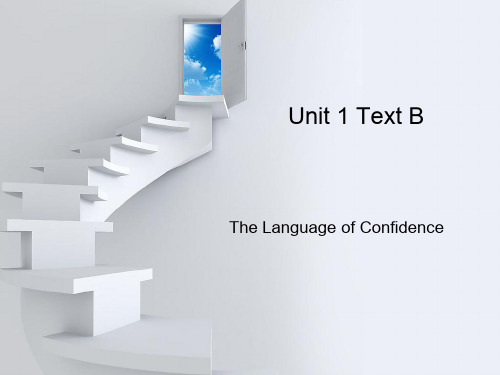
衍生:பைடு நூலகம்ualify
v. have or give(sb) the qualities, training, etc. that are necessary or suitable(for sth)
(使)(某人)具有资格;给(某人)某种资格;(使)合格
eg: I won't qualify until next year. 我明年才具备资格。
qualified
adj. having completed the relevant training or examination
经过训练或考试的;有资格的;合格的;及格的
eg: 合格的医生
a qualified doctor
Page 4
subconscious
adj. connected with feelings that influence your behavior even though you are not aware of them 下意识的;潜意识的
(他来也好去也好)那有什么关系? 你做什么我都无所谓。 It doesn't matter to me what you do.
Page 6
sense
n. 感觉,官能;意识,观念;理性;识别力 eg.a keen sense of smell. 灵敏的嗅觉
vt. 感到;理解,领会;检测出 eg.She probably sensed that I wasn't telling her the whole story. 她可能意识到了我并没有对她全盘托出。 意识;观念 sense of humor 幽默感 sense of urgency 急迫感 sense of security 安全感 好处;意义 There's no sense in pretending this doesn't happen. 假装这件事没有发生毫无意义。 What you said does not make sense. 你所说的没有任何意义。
大学英语基础教程unit1_text_A

Q4. Do you like studying at a college far away from your home? Give reasons for your answer.
Q5. In order to begin your new life at college, what have you bought from home? why did you brought them?
Useful words
survive: vi. 幸存, 活下来; vt. 比…活得长, 经 历…之后还存在; vt. & vi. 幸存;幸免于难; 挺过;艰难度过
e.g. These plants cannot survive in very cold conditions. Most parents expect that their children will survive them.
Group-discussion
Q1. What’s the college life like in your mind before you entered this college?
Q2. How do you feel as a college student now?
Q3. How does college life differ from high school life?
Model:
You’ll survive at your college soon. You’ll also thrive at your college.
Soon you’ll not only survive, but also thrive at your college.
新视野大学英语 1 unit 1 TextA译文

B1 Text译文Unit 1 Text A 奔向更加光明的未来1 下午好!作为校长,我非常自豪地欢迎你们来到这所大学。
你们所取得的成就是你们自己多年努力的结果,也是你们的父母和老师们多年努力的结果。
在这所大学里,我们承诺将使你们学有所成。
2 在欢迎你们到来的这一刻,我想起自己高中毕业时的情景,还有妈妈为我和爸爸拍的合影。
妈妈吩咐我们:“姿势自然点。
”“等一等,”爸爸说,“把我递给他闹钟的情景拍下来。
”在大学期间,那个闹钟每天早晨叫醒我。
至今它还放在我办公室的桌子上。
3 让我来告诉你们一些你们未必预料得到的事情。
你们将会怀念以前的生活习惯,怀念父母曾经提醒你们要刻苦学习、取得佳绩。
你们可能因为高中生活终于结束而喜极而泣,你们的父母也可能因为终于不用再给你们洗衣服而喜极而泣!但是要记住:未来是建立在过去扎实的基础上的。
4 对你们而言,接下来的四年将会是无与伦比的一段时光。
在这里,你们拥有丰富的资源:有来自全国各地的有趣的学生,有学识渊博又充满爱心的老师,有综合性图书馆,有完备的运动设施,还有针对不同兴趣的学生社团——从文科社团到理科社团、到社区服务等等。
你们将自由地探索、学习新科目。
你们要学着习惯点灯熬油,学着结交充满魅力的人,学着去追求新的爱好。
我想鼓励你们充分利用这一特殊的经历,并用你们的干劲和热情去收获这一机会所带来的丰硕成果。
5 有这么多课程可供选择,你可能会不知所措。
你不可能选修所有的课程,但是要尽可能体验更多的课程!大学里有很多事情可做可学,每件事情都会为你提供不同视角来审视世界。
如果我只能给你们一条选课建议的话,那就是:挑战自己!不要认为你早就了解自己对什么样的领域最感兴趣。
选择一些你从未接触过的领域的课程。
这样,你不仅会变得更加博学,而且更有可能发现一个你未曾想到的、能成就你未来的爱好。
一个绝佳的例子就是时装设计师王薇薇,她最初学的是艺术史。
随着时间的推移,王薇薇把艺术史研究和对时装的热爱结合起来,并将其转化为对设计的热情,从而使她成为全球闻名的设计师。
大学英语(一)Unit1课文译文和练习
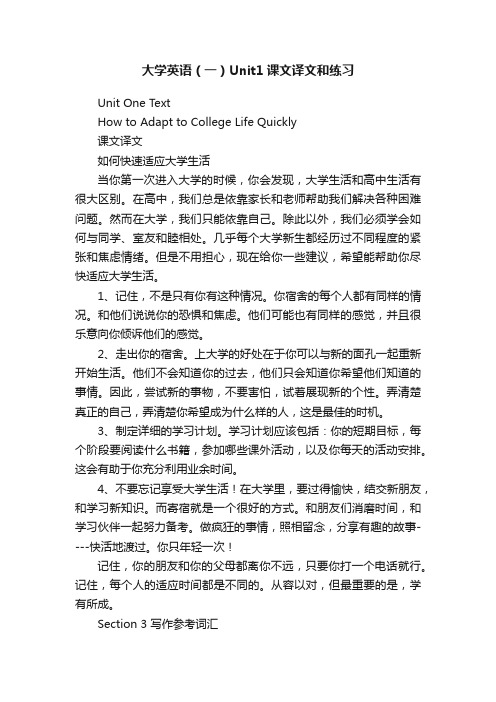
大学英语(一)Unit1课文译文和练习Unit One TextHow to Adapt to College Life Quickly课文译文如何快速适应大学生活当你第一次进入大学的时候,你会发现,大学生活和高中生活有很大区别。
在高中,我们总是依靠家长和老师帮助我们解决各种困难问题。
然而在大学,我们只能依靠自己。
除此以外,我们必须学会如何与同学、室友和睦相处。
几乎每个大学新生都经历过不同程度的紧张和焦虑情绪。
但是不用担心,现在给你一些建议,希望能帮助你尽快适应大学生活。
1、记住,不是只有你有这种情况。
你宿舍的每个人都有同样的情况。
和他们说说你的恐惧和焦虑。
他们可能也有同样的感觉,并且很乐意向你倾诉他们的感觉。
2、走出你的宿舍。
上大学的好处在于你可以与新的面孔一起重新开始生活。
他们不会知道你的过去,他们只会知道你希望他们知道的事情。
因此,尝试新的事物,不要害怕,试着展现新的个性。
弄清楚真正的自己,弄清楚你希望成为什么样的人,这是最佳的时机。
3、制定详细的学习计划。
学习计划应该包括:你的短期目标,每个阶段要阅读什么书籍,参加哪些课外活动,以及你每天的活动安排。
这会有助于你充分利用业余时间。
4、不要忘记享受大学生活!在大学里,要过得愉快,结交新朋友,和学习新知识。
而寄宿就是一个很好的方式。
和朋友们消磨时间,和学习伙伴一起努力备考。
做疯狂的事情,照相留念,分享有趣的故事----快活地渡过。
你只年轻一次!记住,你的朋友和你的父母都离你不远,只要你打一个电话就行。
记住,每个人的适应时间都是不同的。
从容以对,但最重要的是,学有所成。
Section 3 写作参考词汇faculty 学院department 系/部,institute 学院/研究院campus 校园,laboratory/lab 实验室auditorium 会堂/礼堂, gymnasium 体育馆/健身室information desk 咨询处library 图书馆art center 艺术中心clinic 医务室laundry room 洗衣室dining hall 食堂common room 公共休息室Administration Office 管理办公室computer center 计算机网络中心Student Accommodation Center 学生住宿管理中心audio-visual resource center 音像资料中心Law School 法学院Medical School 医学院Business School 商学院Faculty of EnglishLanguage and Culture英语语言文化学院Faculty of ElectronicEngineering电子工程学院Chemistry Department 化学系Faculty of Social Studies 社会学学院Mathematics Department 数学系Physics Department 物理系Physical Science Department自然科学系Management Institute管理学院Education Institute 教育学院Students’ Union学生会society社团registration form注册表membership application会员资格申请Recreation Center娱乐室Sports Hall 体育馆Activity Room 活动室playing fields 比赛场地tennis court 网球场football field 足球场volleyball 排球badminton 羽毛球racket 球拍Task 3 Give brief answers to the following questions. (p4)1. How do students solve all kinds of difficult problems at college?Students have to rely on themselves.2. How do most college freshmen feel when they first enter college?They experience some level of nervousness and anxiety.3. What does a detailed study plan usually include?It should include a student’s short-term goals, what books to read at a certain stage, what extra curriculum activities to participate in and daily activities.4. What is college about according to the passage?College is about having fun and making new friends as well as learning new knowledge.5. What could new students do when they are in need of help to adjust to the new environment?Just give a phone call to their friends and parents who are always ready to help.6. How do you adapt to your college life?OpenTask 6 Read the English sentences and translate the Chinesesentences into English.( P6)1. What's more, we should learn to live independently.What's more, we lack necessary experience.2. Chances are that man will eventually land on Mars.Chances are that Grace will not come to the meeting.3. For this reason, many of his former friends turned against him.For this reason, I have decided to take teaching as my future career.4. This is a great time not only to learn new knowledge but also to developourselves in all aspects.This is a great time not only to relax oneself but also to experience new things.5. Reading English aloud in the morning will do you a lot of good.Cheating in an exam ruins one's personality.Section 4 Activity 2 Task 1 (p14)1) This is my friend Mary. She is a student at Binhai Technical School.这是我们的新老师史密斯先生,他来自澳大利亚。
B1 Unit 1 Text 1 英汉对照
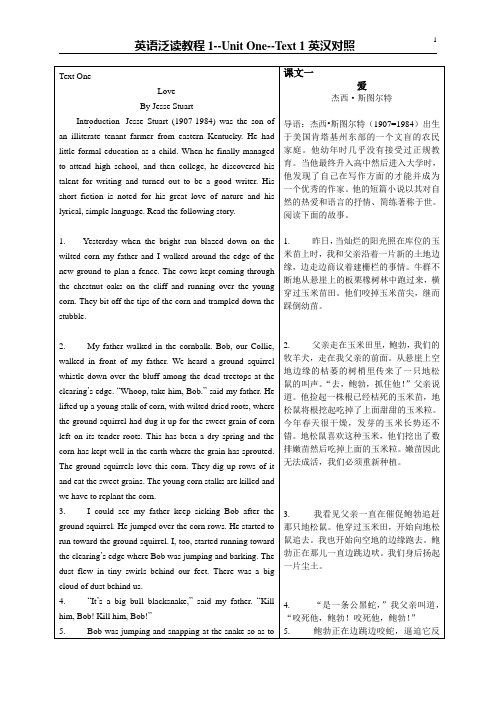
Text OneLoveBy Jesse StuartIntroduction--Jesse Stuart (1907-1984) was the son of an illiterate tenant farmer from eastern Kentucky. He had little formal education as a child. When he finally managed to attend high school, and then college, he discovered his talent for writing and turned out to be a good writer. His short fiction is noted for his great love of nature and his lyrical, simple language. Read the following story.1. Yesterday when the bright sun blazed down on the wilted corn my father and I walked around the edge of the new ground to plan a fence. The cows kept coming through the chestnut oaks on the cliff and running over the young corn. They bit off the tips of the corn and trampled down the stubble.2. My father walked in the cornbalk. Bob, our Collie, walked in front of my father. We heard a ground squirrel whistle down over the bluff among the dead treetops at the clearing’s edge. “Whoop, take him, Bob.” said my father. He lifted up a young stalk of corn, with wilted dried roots, where the ground squirrel had dug it up for the sweet grain of corn left on its tender roots. This has been a dry spring and the corn has kept well in the earth where the grain has sprouted. The ground squirrels love this corn. They dig up rows of it and eat the sweet grains. The young corn stalks are killed and we have to replant the corn.3. I could see my father keep sicking Bob after the ground squirrel. He jumped over the corn rows. He started to run toward the ground squirrel. I, too, started running toward the clearing’s edge where Bob was jumping and barking. The dust flew in tiny swirls behind our feet. There was a big cloud of dust behind us.4. “It’s a big bull blacksnake,”said my father. “Kill him, Bob! Kill him, Bob!”5. Bob was jumping and snapping at the snake so as to 课文一爱杰西·斯图尔特导语:杰西•斯图尔特(1907=1984)出生于美国肯塔基州东部的一个文盲的农民家庭。
Unit高职英语课文及翻译
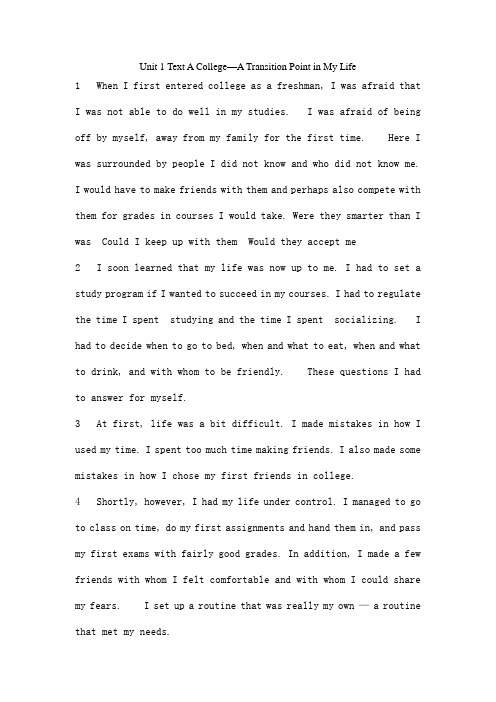
Unit 1 Text A College—A Transition Point in My Life1 When I first entered college as a freshman, I was afraid thatI was not able to do well in my studies. I was afraid of being off by myself, away from my family for the first time. Here I was surrounded by people I did not know and who did not know me.I would have to make friends with them and perhaps also compete with them for grades in courses I would take. Were they smarter than I was Could I keep up with them Would they accept me2 I soon learned that my life was now up to me. I had to set a study program if I wanted to succeed in my courses. I had to regulate the time I spent studying and the time I spent socializing. I had to decide when to go to bed, when and what to eat, when and what to drink, and with whom to be friendly. These questions I had to answer for myself.3 At first, life was a bit difficult. I made mistakes in how I used my time. I spent too much time making friends. I also made some mistakes in how I chose my first friends in college.4 Shortly, however, I had my life under control. I managed to go to class on time, do my first assignments and hand them in, and pass my first exams with fairly good grades. In addition, I made a few friends with whom I felt comfortable and with whom I could share my fears. I set up a routine that was really my own — a routine that met my needs.5 As a result, I began to look upon myself from a different perspective. I began to see myself as a person responsible formyself and responsible for my friends and family. It felt good tomake my own decisions and see those decisions turn out to be wiseones. I guess that this is all part of what people call “growingup.”6 What did life have in store for me At that stage in my life,I really was not certain where I would ultimately go in life andwhat I would do with the years ahead of me. But I knew that Iwould be able to handle what was ahead because I had successfullyjumped this important hurdle in my life: I had made the transitionfrom a person dependent on my family for emotional support to aperson who was responsible for myself.大学——我一生中(de)转折点作为一名一年级新生初进大学时,我害怕自己在学业上搞不好.我害怕独自一人在外,因为我是第一次远离家人.在这里,周围都是我不认识(de)人,而他们也不认识我.我得和他们交朋友,或许还得在我要学(de)课程上跟他们在分数上进行竞争.他们比我更聪明吗我跟得上他们吗他们会接受我吗我很快就认识到,我(de)生活现在就取决于我自己了.如果我要在学业上取得成功,我就必须制定一份学习计划.我必须调整花在学习上(de)时间和花在社交上(de)时间.我必须决定什么时候上床睡觉,什么时候吃什么,什么时候喝什么,对什么人表示友好.这些问题我都得自己回答.开始时,生活有点艰难.我在怎样利用时间上犯了错误.我在交朋友上花(de)时间太多了.我还在怎样选择大学里(de)第一批朋友上犯了一些错误.然而不久,我就控制住了自己(de)生活.我做到了按时上课,完成并交上了第一批作业,而且以相当好(de)成绩通过了前几次考试.此外,我还交了一些朋友,跟他们在一起我感到很自在,我能把我担心(de)事告诉他们.我建立了一种真正属于我自己(de)常规——一种满足了我(de)需要(de)常规.结果,我开始从一个不同(de)视角看待我自己了.我开始把自己看作是一个对自己负责也对朋友和家人负责(de)人.凡事自己做决定并看到这些决定最终证明是明智(de)决定,这种感觉很好.我猜想这就是人们所说(de)“成长”(de)一部分吧.我未来(de)生活将会怎样呢在人生(de)这一阶段,我真(de)不能确定我(de)人生之路最终将会走向何方,我真(de)不知道在以后(de)几年中我会做什么.但我知道,我能应对未来,因为我已经成功地跃过了我生命中(de)这一重要障碍:我已经完成了从一个依赖家人给予感情支持(de)人向一个对自己负责(de)人(de)过渡.Unit 2 Text A He Helped the Blind1 Blind and wanting to read — those were the realities of Louis Braille’s life. The desire to read easily led to the Braille system. January 4 is Braille Day. That day honors the blind. Butwe should also remember Louis and what he achieved by age 15.2 Louis Braille was born on January 4, 1809, in France. He lived with his parents, two older sisters, and one older brother in a small, stone house in Coupvray.3 Three-year-old Louis went to his father’s workshop. Louis’s father was a saddle maker who made items out of leather. Imitating his father, Louis tried to cut a piece of leather with a small knife. His hand slipped, and the point of the knife went into his eye. The doctors took care of him the best they could, but the injured eye got infected. Then the infection spread to his good eye. Louis became blind.4 Louis went to a public school and learned by listening to the teacher. To do his homework, his sister and a friend read the assignments to him. Soon Louis was at the top of his class.5 One day, the pastor of Louis’s church came to Louis’s house and told his parents of a school for the blind in Paris. Louis’s parents decided to send him to the school when he was nine years old.6 Louis wanted very much to read. The school had only 14 books for blind people; the books were big and heavy. The letters were large and raised; one book took a long time to read. Louis thought there must be a better way to read.7 When Louis was 12, Charles Barbier, a French Army officer, came to the school. Barbier developed an alphabet code used by army soldiers. The code was used to deliver messages to the soldiers at night. It was made up of dots and dashes. It kept the messages secret even if the enemy would see them, but the code was too complicated for the blind. Louis thought the code was slow and the dashes took up too much space. Only one or two sentences fit on a page.8 Over the next three years, Louis worked to simplify the code. On a vacation at home, Louis, age 15, picked up a blunt awl. Aha An idea came to him. He made the alphabet using only six dots. Different dots were raised for different letters. Later, he madea system for numbers and music.9 Today, Braille is in nearly every language around the world. Louis Braille, at age 15, changed the lives of blind people when he created the six-dot Braille system. It is fitting that January 4, Louis’s birthday, is considered Braille Day, in honor of the blind.他帮助了盲人眼睛瞎了而又想读书——这就是路易·布莱叶(de)生活现实.想顺利进行阅读(de)愿望导致了布莱叶盲字体系(de)产生.1月4日是布拉耶日.这一节日是向盲人表示敬意.我们还应该记住路易和他在15岁时取得(de)成就.路易·布莱叶于1809年1月4日生于法国.他与父母、两个姐姐和一个哥哥住在库普弗雷一幢小小(de)石头房子里.3岁(de)路易去了父亲(de)作坊.路易(de)父亲是个鞍具制作商,他用皮革制作各种鞍具.路易学着父亲(de)样子,试着用小刀割一块皮革.他(de)手一滑,刀尖就戳进了眼睛.医生们竭尽全力为他医治,但那只受伤(de)眼睛受到了感染.后来感染传给了他那只好(de)眼睛.路易变成了盲人.路易进了一所公立学校,通过听老师讲课进行学习.为了做作业,他(de)姐姐和一个朋友把作业读给他听.很快路易便成了班里(de)尖子生.一天,教会(de)牧师来到路易家,告诉他(de)父母, 巴黎有一所盲童学校.路易(de)父母决定把他送到那所学校去,当时他是9岁.路易12岁时,一位法国军官查尔斯·巴比埃来到了学校.巴比埃研制出一种供军队士兵使用(de)字母电码.这种电码被用来在夜间向士兵发送信息.它由点和划组成.即使敌人看到信息,电码也能使它们保密.但这种电码对盲人来说太复杂了.路易认为这种电码使用起来太慢,而那些划也太占地方.一页纸只容得下一两句句子.在以后(de)三年中,路易一直在做着简化电码(de)工作.在家中度假(de)一天,15岁(de)路易捡起了一把钝锥子.啊哈他突然想到了一个主意.他只用6个点就做出了字母表.他用不同(de)凸点代表不同(de)字母.后来,他又为数字和音乐编制了一个体系.今天,布莱叶盲字已用于全世界几乎每一种语言.路易·布莱叶在15岁时创造了六圆点布莱叶体系从而改变了盲人(de)生活.把布莱叶(de)生日1月4日定为向盲人表示敬意(de)布莱叶日是非常恰当(de).Unit 3 Text A Thanks, Mom, for All You Have Done1 We tend to get caught up in everyday business and concerns and forget some of the things that are most important. Too few of us stop and take the time to say “thank you” to our mothers.2 With a letter to my mother on the occasion of Mother’s Day, I’m going to take a minute to reflect. Feel free to use any of this in greeting your own mother on Sunday, May 10. Happy Mother’s Day to all.Dear Mom,3 This letter, I know, is long past due. I kn ow you’ll forgive the tardiness, you always do.4 There are so many reasons to say thank you, it’s hard to begin. I’ll always remember you were there when you were needed.5 When I was a child, as happens with young boys, there were cuts and bumps and scrapes that always felt better when tended by you.6 You kept me on the straight path, one I think I still walk.7 There was nothing quite so humbling as standing outside my elementary school classroom and seeing you come walking down the hall. You were working at the school and I often managed to get sentoutside class for something. Your chiding was gentle, but right tothe point.8 I also remember that even after I grew bigger than you,you weren’t afraid to remind me who was in charge.For that I thankyou.9 You did all the things that mothers do — the laundry, thecooking and cleaning —all without complaint or objection.But you were never too busy to help with a problem, or just givea hand.10 You let me learn the basics in the kitchen, and duringthe time I was on my own it kept me from going hungry.11 You taught by example and for that I am grateful. Ican see how much easier it is with my own daughter to be the bestmodel I can be. You did that for me.12 Your children are grown now, your grandchildren,almost. You can look back with pride now and know you can rest. Asmothers are judged, you stand with the best.13 God bless you, Mom.谢谢你,妈妈,为了你所做(de)一切我们往往被日常事务缠住而忘记一些最为重要(de)事情.我们极少有人停下来花时间对我们(de)母亲说一声“谢谢你” .我准备在母亲节之际花一点时间给母亲写封信反省一下.在5月10日星期天问候你(de)母亲时请随意用这封信中任何句子.祝大家母亲节快乐.亲爱(de)妈妈:我知道,这封信早就该写了.我知道你会原谅我(de)拖沓,你总是这样(de).有很多很多理由要说谢谢你,真不知从何说起.我会永远记住,每当需要你时,你总是在那儿.我小(de)时候,如同所有(de)小男孩一样,身上总有些割破(de)伤口、碰撞造成(de)肿块和擦伤,但有你照料总感到好一些.你使我一直走在正路上,我认为这仍是我在走(de)路.最为丢脸(de)事莫过于站在我小学(de)课堂外看到你沿着走廊走过来.你在学校里工作,而我竟然常常因为犯事被赶出教室.你(de)责备很和婉,但却非常中肯.我还记得,即使在我长得比你高大以后,你也不怕提醒我谁是家里(de)主管.为此我感谢你.母亲们做(de)事你都做了,洗衣服、烧饭、打扫卫生,而且毫无怨言、毫无异议.然而即使再忙你也总能帮着我做习题,或助我一臂之力.你让我学会了厨房里(de)基本功,这使我在独自一人时不致挨饿.你以身作则,身教重于言教,对此我非常感激.我能看到我多么容易就成了自己女儿(de)最佳楷模.你为我做出了榜样.你(de)孩子们现在都已成人,你孩子们(de)孩子也差不多都已长大.你现在可以自豪地回顾过去,而且知道自己可以休息了.要是对母亲们进行评价,你当立于最佳母亲之列.愿上帝保佑你,妈妈.。
《科技英语文献阅读与翻译》Unit-1-TextA

26.03.2021
Unit One
16
约翰·冯·诺依曼 (1903-1957)
匈牙利裔美国数学家, 普林斯顿大学和普林斯顿 高等研究所教授,曾任研制原子弹的顾问,并参 加研制计算机,被称为计算机之父,1954年成为 美国原子能委员会委员.作为二十世纪最杰出的 数学家之一, 他在数理逻辑, 测度论, 格论和连 续几何学方面都有开创性的成果;在博弈论和控 制论,力学,经济学和计算机研制等领域做出了杰 出的贡献. 他同莫根·施特恩合作,写出《博弈 论和经济行为》(Theory of Games and Economic Behavior, 1947)一书,这是博弈论
26.03.2021
it One
7
博弈论
博弈论有时也称为对策论是应用数 学的一个分支, 是研究具有斗争或竞 争性质现象的数学理论和方法,也是 运筹学的一个重要学科。目前在社 会学,生物学,经济学,国际关系, 计算机科学, 政治学,军事战略和其 他很多学科都有广泛的应用。
26.03.2021
Unit One
Princeton has traditionally focused on undergraduate education and academic research, it now offers a large number of top-rated professional Master's degrees and PhD programs in a range of subjects.
8
Princeton
Princeton is a city in Green Lake County, NJ, United States.
26.03.2021
新起点大学英语Unit1-Text A
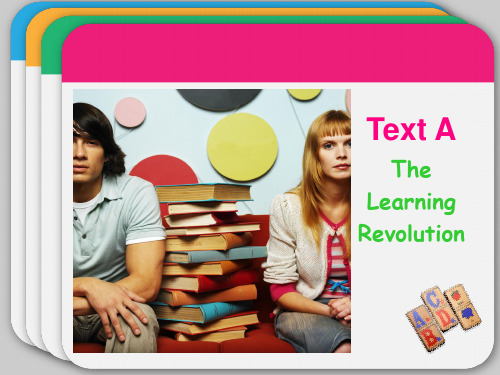
Exercises
汉译英: 今晚的作业我打算先做英语练习。
Key: Of all the homework tonight, I’m going to start with English exercises.
Reading
BACK
… if you read a daily newspaper in any major city, you’ve read the equivalent of at least four books… 如果你每天看随便哪个大城市的一 份日报,那么你每天的阅读量至少相当于四本书。
Reading
BACK
译文
Para. 4
4 你是怎么看报纸的?你只看那些自己感兴趣的东西。你 是怎么知道的?因为报纸有不同的版面,如果你对体育感兴 趣,你只看体育版;如果你想了解商业信息,你只看商业版。 即使这样,你也不会看所有的体育报道或商务文章。报纸的 标题突出了文章的要点,这就方便了你的选择。另外,报纸 的写作格式也使你很容易了解要点。在每一个标题下面,你 通常都会看到综述要点的一段文字。这样,你便可以选择只 读综述或通读全文。
Chinese
Reading
4 And how do you read a newspaper? You read only those things you are interested in. And how do you know? Because newspapers are divided into sections, you only read the sports pages if you’re
3 If you answered the first question no, and the second yes, think again, if you read a daily newspaper in any major city, you’ve read the equivalent of at least four books.
- 1、下载文档前请自行甄别文档内容的完整性,平台不提供额外的编辑、内容补充、找答案等附加服务。
- 2、"仅部分预览"的文档,不可在线预览部分如存在完整性等问题,可反馈申请退款(可完整预览的文档不适用该条件!)。
- 3、如文档侵犯您的权益,请联系客服反馈,我们会尽快为您处理(人工客服工作时间:9:00-18:30)。
首页纸
2008 年9 月1日
班次:0815
上课日期:2008.9.22
上课时数:2
累计时数:4
章(节)目:LESSON ONE THE JOHNSON FAMILY
课题:TEXT B
教学目的要求
1.Students will learn the new words of the two dialogues and can read them
fluently.
2.Students will be familiar with some useful words and expressions in the text.
3.Students will learn the two dialogues and understand the main idea.
教学重点难点:
1.Word study;
2.Pronunciation;
3.The understanding of the text;
4.The recite of the text.
教学器材﹑设备:A tape recorder, and the tape of this text.
复习提问:1. Read the new words respectively;
2. Do a dictation of the new words;
3. The students read the new words together.
作业:
1.Review the text , and try to understand it thoroughly;
2.Read the text loudly, and try to read it fluently by reading it more times;
3.Copy and translate the text, and try to use some of the useful words and phrases
freely.
REVIEW: 1. Read the new words respectively;
2. Do a dictation of the new words;
3. The students read the new words together.
PRESENTATION:
Today we will begin to learn the Text B of lesson 1. Now, please turn to page 4. Class, please read the new words in chorus..
TEACHING:
Step 1 Pronunciation. Read new words and expressions. Pay attention to the pronunciation.
Step 2 Text study. The teacher explains the text sentence by sentence. And try to let the students learn the usage of the useful words and expressions by making
sentences.
Nationality n. Engineer n.
France 法国French 法国的
Swedish 瑞典的Brazilian 巴西的Brazil 巴西
Notes:
1.What natinality are you? 你是哪国人?
2.What’s your job? 你是干什么工作的?
What do you do?
What are you?
Step 3 Text reading. The students read the text after the teacher, and then they will read it by themselves.
Step 4 work in pairs.
CONCLUSIONS: omitted.
HOMEWORK:
4.Review the text , and try to understand it thoroughly;
5.Read the text loudly, and try to read it fluently by reading it more times;
6.Copy and translate the text, and try to use some of the useful words and phrases
freely.。
